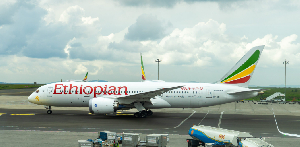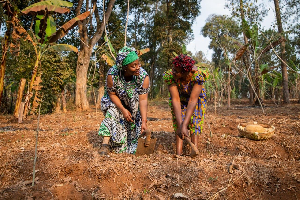Fifty communities in the Lawra District of Upper West Region have been certified as Open Defecation Free (ODF) by the Regional Inter-Agency Coordinating Committee on Sanitation (RICCS).
The certification means that members of the communities now have their own household latrines and no longer attend to the call of nature in the open. The journey to achieving the feat began around August 2014 in a DFID-funded project dubbed “Sustainable Sanitation and Hygiene for All (SSH4A).
The project is being implemented in eight districts in Ghana including the Lawra District by SNV-Ghana.
Speaking on ODF declaration day in Lawra, Mr Harm Duiker, Country Director of SNV-Ghana, congratulated the communities for their commitment in helping to fight the sanitation hazard.
The chiefs, the District Assembly, RICCS and other institutions that constituted the District Inter-Agency Coordination Committee (DICCS) were also congratulated for contributing to the success.
“This shows that an integrated approach to solving sanitation access in the rural areas is working,” Mr Duiker said.
An end-line household survey conducted by the project in last quarter of 2017, showed the practice of open defecation had been reduced to about 6.0 percent from the baseline figure of 78 percent in 2014.
“Though this might not look impressive, the survey also revealed that as high as 50 percent of households do not have a latrine on their own but access a neighbours own (shared)”, he said.
“This is too high to be tolerated, as it affects the hygienic management of the facility.”
Mr Duikeralso said sensitization has been carried out on proper hand washing with soap in a campaign dubbed “one community, all hands clean” in the entire district.
“Hand washing with soap is gradually gaining acceptance in communities as a result of the sensitization on hygienic practices” he said.
He appealed to the Lawra District Assembly to adequately make budgetary provision and resources available for the Environmental Health and Sanitation division to continue to upscale the Community Led Total Sanitation (CLTS) in communities and reduce over dependence on donor support to fund the sector.
Mr Martin Domotiere Bomba-ire, Lawra District Chief Executive (DCE), said with the declaration of the 50 communities as ODF, the Lawra District was now 65 percent ODF and second to the Nandom District that attained 91 percent ODF status in the region.
The ODF score has contributed in moving the District from 60th position in the 2016 to 10th position in the 2017 ODF league table nationwide. The DCE urged communities not to relapse to their old ways but work hard to sustain their current status.
“This would ensure you moved to the ultimate status where communities would have improved latrines, improved waste management systems for both solid and liquid, and improved water storage as well as the practice of hand washing with soap under running water to ensure holistic sanitation,” he said.
Madam Freda Naatu, Upper West Regional CLTS Coordinator, who read a speech on behalf of the Regional Environmental Health Officer, disclosed that 4.5 billion people lived without household toilets that safely disposed off their waste.
The provision of proper toilets could save lives of more than 200,000 children in the world, according to the United Nations.
The communities were presented with certificates and bicycles; and this is to to encourage other communities to emulate their example.
Regional News of Monday, 12 February 2018
Source: ghananewsagency.org













